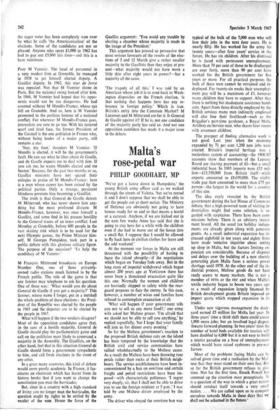Malta's rose-petal war
PHILIP GOODHART, MP
'We've got a house down in Hampshire,' the young British army officer said as we walked through the streets of Valetta, 'but we've rented it and I don't suppose that we shall be able to get the people out at short notice. The Ministry of Defence are obviously not going to have houses ready for us and so that means a hostel or a caravan. Anyhow, if we are kicked out in the next few weeks Anne has said that she is going to stay here for a while with the children even if she had to move out of the house into a small flat. I suppose that I would be allowed to fly back here in civilian clothes for leave and the odd weekend.'
At the moment our forces in Malta are still threatened with the possibility of having to leave the island abruptly—if the negotiations which began on Tuesday fade away. But in the long story of imperial withdrawal which began almost 200 years ago at Yorktown there has never been a threatened evacuation quite like this one. Normally the women and children are hurriedly shipped to safety while the rear- guard prepares to face the enemy. In this case, however, a number of wives and families have refused to contemplate evacuation at all.
'What will happen if your government tells you not to sell us any more food?,' one army wife asked her Maltese grocer. 'I'm afraid that we should not be able to sell you anything,' he replied regretfully, 'but I hope that your family will join us for dinner every evening?.
So far the Maltese government's reaction to the proposed British defence cuts on the island has been tempered by the knowledge that the British civil and service communities have rallied wholeheartedly to the Maltese cause. As a result the Maltese have been throwing rose petals rather than rocks at their British neigh- bours. The service establishments have been in- convenienced by a ban on overtime and certain freight and petrol restrictions have been im- posed—with characteristic politeness. 'I regret very deeply, sir, that I shall not be able to drive you to see the foreign minister at 5 p.m.,' I was told by one Maltese driver employed by the army.
The driver who obeyed the overtime ban was typical of the bulk of the 7,000 men who will lose their jobs in the next four years. He is nearly fifty. He has worked for the army for twenty years—after four years' service in the forces. He has six children. After his dismissal he is faced with permanent unemployment. More than 70 per cent of those to be discharged are over forty, more than 90 per cent have worked for the British government for five years or more. For all practical purposes the bulk of these men cannot be retrained and re- deployed. For twenty-six weeks their unemploy- ment pay will be a maximum of £3, however many children they have to support. After that there is nothing but inadequate assistance hand- outs. Apart from those directly employed by the British services many men indirectly employed will also lose their livelihood—such as the Brigadier's part-time gardener, a Royal Malta Artillery ex-Service man, who shares four rooms with seventeen children.
The prospect of finding alternative work is not good. Last year when the economy expanded by 71 per cent 1,200 new jobs were created. Britain's imperial heritage was a meticulous system of accounting—the 1966/67 accounts show that members of the Leprosy Board are sharing payment of fl—but a small industrial base. In 1965 imports were £35 mil- lion—£13,350,000 from Britain itself—while exports amounted to £8,650,000. The visible trade gap then amounted to more than £75 per person—the largest in the world for a country of this size.
The idea coyly revealed by the British government during the last House of Commons debate, that a high-powered team of visiting in- dustrialists might find some solution, is re- garded with scepticism. There have been com- missions before. There is an advisory invest- ment board. All the usual tax holiday induce- ments are already given along with generous grants. As a result industrial expansion has in- creased eightfold in ten years and eighty firms have made tentative inquiries about setting up shop in Malta, but the factors limiting ex- pansion are considerable. Because of disputes and delays over the building of a new electric generating plant Malta faces a serious power shortage until 1970. At the other end of the in- dustrial process, Maltese goods do not have ready access to many markets. She is not a member of EFTA or the EEC and when Malta's textile industry began to boom two years ago as a result of expansion largely financed by British development grants Britain imposed an import quota which stopped expansion in its tracks.
Under new vigorous management the dock- yard earned £5 million for Malta last year. In three years' time a third shift there could create 1,900 more jobs; but an involved legal dispute thwarts forward planning. In two years' time the number of hotel beds available for tourists will have doubled to 6,000 but it is not easy to build a tourist paradise on a base of unemployment which would have raised eyebrows in pre-war Jarrow.
Most of the problems facing Malta can be solved given time and a realisation by the Mal- tese that they must stand on their own feet. But so far the British government refuses to give time. Not for the first time, Enoch Powell has summed up the situation most perceptively. 'It is a question of the way in which a great nation should conduct itself towards a very small nation. . . . We are called upon so to comport ourselves towards Malta in these days that we shall not be ashamed in the future.'


































 Previous page
Previous page